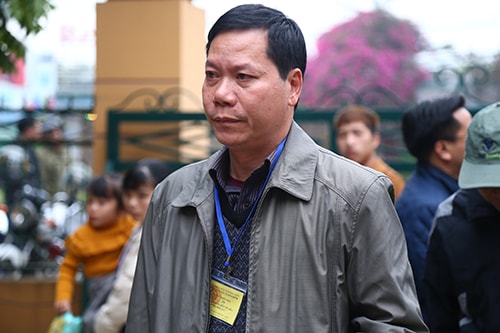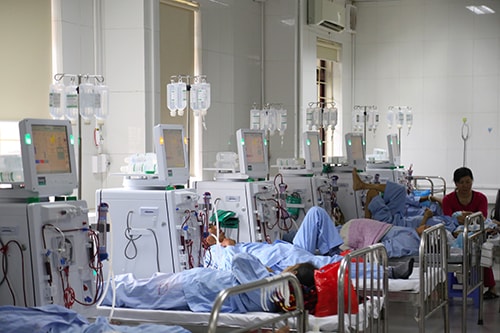Hoa Binh Hospital lets water filtration for hemodialysis float
Hoa Binh General Hospital established its own hemodialysis unit, cooperating with an equipment supplier.
On the afternoon of January 14, in response to the People's Court of Hoa Binh City regarding whether Hoa Binh General Hospital is allowed to establish an artificial kidney unit to perform blood filtration techniques, defendant Truong Quy Duong (former director of the hospital) replied: Establishing a unit is the defendant's authority, only when establishing a department or room must a project be made to request the provincial Department of Health for permission.
The establishment of the unit can theoretically be decided by the head of the department. However, the artificial kidney unit has many complexities in terms of technology, procedures and human resources, so the hospital director directly decides.
|
Former director Truong Quy Duong. Photo:Pham Du. |
Citing Decision 23 of the Ministry of Health, Mr. Duong said that dialysis is a technique that is implemented in provincial, central and even commune level hospitals if qualified. In 2009, the Department of Health of Hoa Binh province approved the list of techniques in medical examination and treatment under the authority of Hoa Binh General Hospital. This included the approval of artificial kidney dialysis techniques. Based on this, Mr. Duong signed the decision to establish a dialysis unit under the Department of Intensive Care, but operating under the regulations of the dialysis department.
In March 2010, Deputy Director Hoang Dinh Khieu, representing Hoa Binh General Hospital, signed a contract to transfer blood filtration technology with Bach Mai Hospital (Hanoi). 26 doctors and nurses of the blood filtration unit were then trained in the form of "hands-on training" at Bach Mai Hospital.
|
Dialysis machine at Hoa Binh General Hospital. Photo:Pham Du. |
However, according to the authorities' investigation, in the kidney unit, Mr. Duong did not arrange engineers or technicians to check the quality of water and water dialysis fluid before, during and after dialysis. From 2014 to 2017, he also did not have a decision to assign a person in charge of this unit.
As the director, he did not issue regulations on operation, maintenance and safety techniques for using the RO system, allowing employees to use it arbitrarily. Mr. Duong signed contracts and terminated repair contracts but did not closely inspect, resulting in the deaths of 9 people.
In his testimony at the court on January 14, Mr. Duong said that the artificial kidney unit operates like a department in the hospital, so the work of the personnel is coordinated by the department head. According to the hierarchy of functions and powers, the authority to assign people to the unit belongs to the department leader.
Patients pay 7.7 USD per hemodialysis session.
In 2009, Mr. Duong, representing Hoa Binh General Hospital, signed a contract to jointly exploit the hemodialysis system. For each hemodialysis cycle, the patient must pay 400,000 VND/session. This price has been approved by the People's Committee of Hoa Binh province. "If there is any additional payment, it is because the unit arbitrarily collected it and whoever collects it will be responsible," said Mr. Duong.
Every day, the nurse who arrives first will start the RO water filtration system and observe the safety indicator of the conductivity meter. After examining the patient and seeing that the vital signs are satisfactory, the doctor will order dialysis.
For each dialysis session, Thien Son Company (the equipment supplier) receives 90% and no more than 3,800 runs on one machine. Thien Son is responsible for instructing on the machine's use techniques. Hoa Binh Hospital provides human resources, trains doctors, nurses and technicians responsible for the technical aspects.
During the time of many fluctuations in import prices and bank interest rates, Thien Son Company received 7.7 USD per dialysis session. After completing the agreed number of dialysis sessions, the hospital had full rights to use the machine.
|
Director of Thien Son Company Do Anh Tuan. Photo:Pham Du. |
"There are many companies that supply equipment, so why did the hospital sign a contract with Thien Son?", the jury asked. Mr. Duong replied: Thien Son has the legal authority and capacity to meet the hospital's professional needs.
According to defendant Duong, the decision on how to perform dialysis for patients is the hospital's responsibility, Thien Son has no right to intervene. Thien Son only assigns supervisors to monitor the dialysis sessions to ensure their rights, but is not responsible for supervising the dialysis process.
This morning, the trial continued its second working day.
According to the indictment, on the morning of May 29, 2017, 18 patients undergoing dialysis at Hoa Binh General Hospital showed signs of abnormality. 9 people died. The cause was due to an unsafe water source for dialysis. The case was then brought to trial three times within 6 months but was postponed all the times.
Hoang Cong Luong (doctor) and Bui Manh Quoc were later tried for the crime.Involuntary manslaughteraccording to Clause 2, Article 98 of the 1999 Penal Code with a penalty of three to 10 years in prison.
Truong Quy Duong (former director of the hospital), Hoang Dinh Khieu (former deputy director of the hospital), Tran Van Thang (former head of the supplies department), Tran Van Son (officer of the supplies department) and Do Anh Tuan (Director of Thien Son Pharmaceutical Joint Stock Company) were prosecuted for the crime.Lack of responsibility causes serious consequences, according to Clause 2, Article 285 of the 1999 Penal Code with a penalty of three to 12 years in prison.




